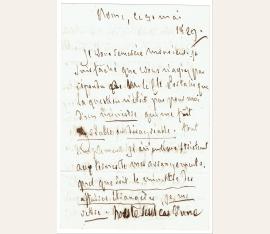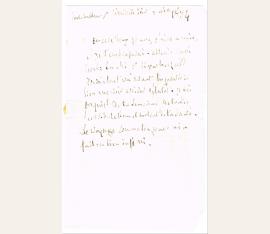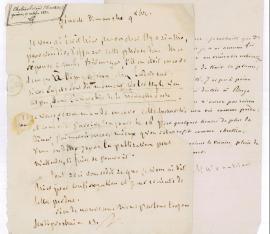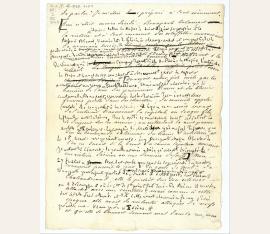French writer, politician, diplomat, and historian, who is considered the founder of Romanticism in French literature. Autograph letter signed. Rome. 8vo. 4pp.
9.500 €
(46910)
Au marquis de Boissy. Importante lettre sur la fin de son ambassade à Rome, et sa nomination éventuelle comme ministre des Affaires étrangères. [Chateaubriand démissionnera de l?ambassade le 30 août suivant, après la formation du ministère Polignac.]{CR}... «Je suis fâché que vous n?ayiez pas répondu à M. le Cte Portalis [ministre des Affaires étrangères] que la question n?étoit pas pour moi d?un ministre qui me fût agréable ou désagréable. Tout simplement je m?en tiens strictement aux termes de mes arrangements.
Quel que soit le ministre des affaires étrangères, je me retire. Hors le seul cas d?une nouvelle combinaison ministérielle pour laquelle j?aurois été consulté et à laquelle j?aurois consenti. Je m?en tiens là. Je ne profiterai point de mon congé. Je ne veux point aller me perdre au milieu de partis qui ont fait tant de sottises, postuler un ministère que je ne desire pas et qu?on ne me donnerait pas, jeter ensuite ma demission aux pieds du Roi par dépit. Tout cela n?est ni assez prudent pour ma vieille expérience, ni assez grave pour mon âge, ni assez digne pour mon caractère. Aussitôt qu?un ministre des affaires etrangeres aura été nommé, je quitte Rome avec mon congé je viens expliquer et rappeler au Roi la condition premiere et capitale de mon acceptation de l?ambassade de Rome et je le supplie de me permettre d?aller m?ensevelir dans mon infirmerie. Voila monsieur, ce que je vous prie dire aux ministres de ma part et à tous mes amis. Reduisez je vous en prie toutes vos démarches à cela ou plutôt ne faites aucune démarche»....
(1768-1848). L.A., Fontainebleau 7 novembre 1834, à sa femme la Vicomtesse de Chateaubriand à Paris. 3/4 page in-8, adresse.
4.000 €
(46912)
„Encore deux jours, chère amie, et je t’embrasserai. Attends moi donc Lundi et si par hazard j’avois tout vu avant, tu pourrois bien me voir arriver plutôt. Je suis inquiet de ta semaine, de toutes tes tribulations et surtout de ta santé. Le voyage comme toujours m’a fait un bien infini“
écrivain romantique et homme politique français (1768-1848). L.A., à sa femme la Vicomtesse de Chateaubriand à Paris. Thibouville. 1 page in-8, adresse autographe.
3.800 €
(46913)
Séjour à Thibouville auprès de Madame Récamier. Il est arrivé «bien portant et par le plus beau temps du monde. Je vais aller maintenant à travers les prairies, voir les hôtes de la chapelle St Éloi [Mme Récamier]. Je tembrasse. Je tai écrit dÉvreux où jai couché hier, par la Diligence»
écrivain romantique et homme politique français (1768-1848). Lettre autographe. Lonné. 3 pp. in-8, adresse.
4.500 €
(44947/BN30993)
À Madame de Pisieux. Pittoresque lettre de remerciements après le séjour à Montgraham. Durant l'été 1817, les Chateaubriand se rendirent à Montboissier (Eure-et-Loir), Montgraham, Lonné (Orne) et Voré. Le souvenir de leur court séjour à Montboissier est conservé dans un célèbre passage des Mémoires d'outre-tombe commençant ainsi: "Je fus tiré de mes réflexions par le gazouillement d'une grive perchée sur la plus haute branche d'un bouleau […]".
écrivain romantique et homme politique français (1768-1848). Deux lettres signées, dont une autographe à Hyacinthe Pilorge et une autre de la main de ce dernier à un vicaire. Genève. I: À Hyacinte Pilorge. Une page autographe in-8, Genève, dimanche 9 octobre [1831], adresse au dos. Déchirure avec manque en bout de deux lignes de texte. - II: À un vicaire. Une page signée in-8, mardi 15 mars 1842.
4.500 €
(45288/BN31621)
I: À propos d'une chanson de Béranger qui lui est dédiée. Il a écrit la veille à son "cher Hyacinte, pour [lui] dire d'effacer cette phrase dans [sa] réponse à M. de Béranger, s'il en étoit encore temps à l'impression chez Ladvocat: Si vos sujets sont du moment, votre style ne l'est pas, dans l'anarchie de la nouvelle école [...]". Il annonce son arrivée à Paris, le 16 et "aimerai[t] que l'on retarde "d'un ou deux jours la publication, si faire se pouvoit [...]". - Alors que Chateaubriand, après avoir refusé de reconnaître à la chambre des pairs la légitimité du pouvoir de Louis-Philippe, s'était quelque temps réfugié en Suisse, l'écrivain Pierre-Jean de Béranger avait fait paraître une chanson, "à M.
de Chateaubriand", qui commençait ainsi: "Chateaubriand, pourquoi fuir ta patrie, fuir son amour notre encens et nos soins? N'entends tu pas la France qui s'écrie: mon beau ciel pleure une étoile de moins". La chanson de Béranger et la Réponse de Chateaubriand allaient paraître dans Paris ou le livre des Cent-et-un, une publication du libraire éditeur Ladvocat qui connut quinze volumes de 1832 à 1834. Son ambition était d'offrir une image de la vie parisienne en demandant des collaborations aux principaux écrivains de l'époque. - II: À un vicaire. Une page signée in-8, mardi 15 mars 1842. Cette seconde lettre est de la main de son secrétaire, mentionné dans la lettre "j'ai à peine pu signer ces lignes que j'ai dictées à Pilorge". Il "regarde le reste de [sa] vie comme perdu: tant mieux ; c'est quelques heures de plus à [son] profit comme Chrétien"..
French poet and statesman (1768-1848). "Mémoires d'Outre Tombe". Autograph manuscript (fragment). N. p. o. d. 8vo. 1 p. French manuscript on paper.
4.500 €
(92327/BN61418)
Exceedingly rare, historically important manuscript of Chateaubriand's famous memoir, describing the dramatic events of the campaign in north-eastern France in February 1814, Napoleon's final campaign of the War of the Sixth Coalition that ended with the Battle of Paris and Napoleon's abdication. - The manuscript corresponds to two paragraphs of the 6th volume of the original publication in a chapter entitled "Admirable campagne en France 1814". Added between the lines, in a secretary's hand, are passages from the beginning of the slightly later chapter "La guerre étabie aux barrières de Paris", describing the Battle of Paris.
Both texts show important and highly interesting departures from the posthumously published text. - Due to Napoleon's unexpected successes, especially during the so-called Six Days' Campaign (10-15 February), the Coalition leaders gathered near Troyes and offered Napoleon an armistice that would have allowed him to keep the throne. However, Napoleon insisted on terms unaccaptable to the allies: thus, they reaffirmed their coalition against Napoleon in the Treaty of Chaumont and successfully concluded the campaign in France. In Chateaubriand's dramatization, Napoleon "tore apart the preliminaries of the peace offered to him, shouting: 'I am closer to Vienna than the Emperor of Austria is to Paris'". Of course, Chateaubriand was an outspoken adversary of Napoleon, and his testimony must be received with caution. In the last sentence of the manuscript, he quotes Napoleon again, ahead of the Battle of Arcis-sur-Aube with the Austrian forces, which ended in a French retreat: "I will take on my father-in-law in Troyes". In a departure from the printed text, Chateaubriand here mentions that the Allies feared an insurrection and the death of Guillaume Emmanuel Guignard de Saint-Priest, a French royalist general in Russian services, from an injury he sustained during the Battle of Reims. - With minor tears to the right margin..






